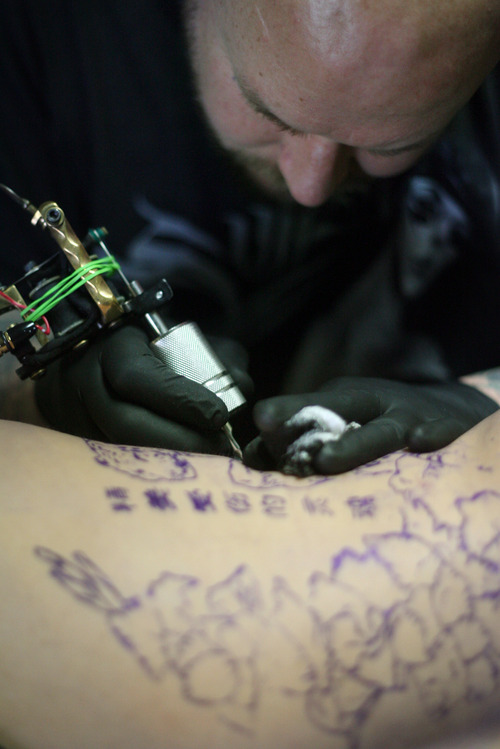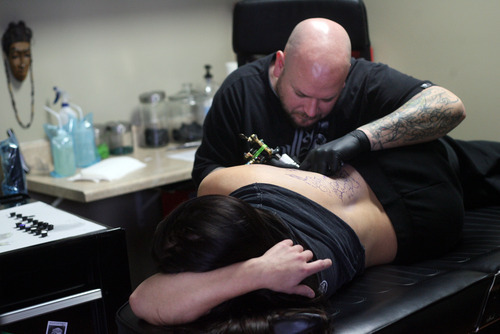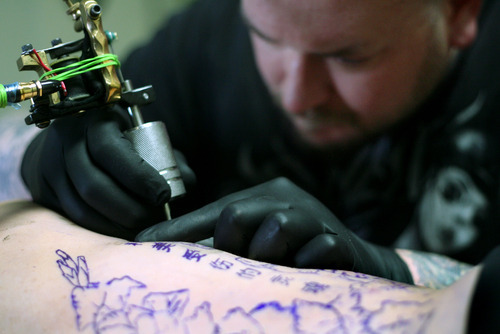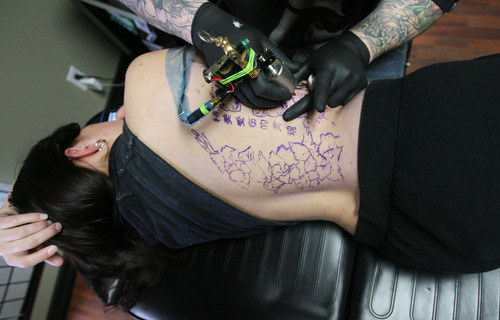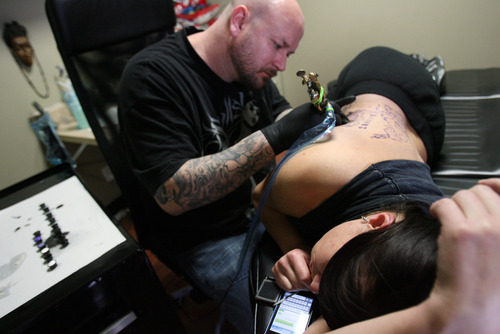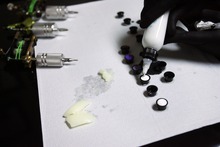This is an archived article that was published on sltrib.com in 2011, and information in the article may be outdated. It is provided only for personal research purposes and may not be reprinted.
Layton • Artist Jared Preslar's speciality is etching Japanese tattoos. He says it's the only style of tattooing that has rules. Cherry blossoms, for example, must be pink and red.
To a client who seeks yellow blooms, "I refuse because it would be disrespectful."
The tattooed Preslar might be considered a stickler for rules: He's in the unusual position of asking the Davis County Health Department to add more requirements to its regulations for body art facilities.
Most business owners want less oversight. But Preslar fears for the future of tattooing: He says he's seen clients seeking help at his shop to cover infected tattoos performed elsewhere.
He said employees of other stores say they reused needles and didn't sterilize the reusable equipment, both health code violations. And he believes cross-contamination from unsanitary practices — not cleaning or covering an arm rest between clients — is rampant and could lead to hepatitis, tuberculosis and HIV infections.
While he doesn't have proof that diseases are spreading, he believes it is inevitable.
"We don't have enough regulations in Davis County and Utah, period," said Preslar, who opened his Lucky Bamboo Tattoo in a strip mall on Main Street five years ago.
"My main worry is that this is going to turn into such a major health issue that they're just going to make tattooing illegal."
New York City once banned tattooing, due to health concerns, before legalizing it again in 1997.
Preslar is calling on the county's board of health to license artists, require cleaner practices and inspect facilities more often. Last month, he proposed his changes to the board, which will take up the ideas again in February. He said his recommendations are followed in other states, including Hawaii.
Preslar wants to require that facilities hire only licensed technicians who would have to demonstrate they understand anatomy, skin diseases and infection control procedures including waste disposal, hand washing techniques and sterilization methods.
The health department does not currently license people giving tattoos. Such a requirement would have to come from the state's Division of Professional Licensing. The health department requires operators annually attend a one-hour class on blood-borne pathogens.
"Literally anyone can do it. Anybody can open a shop," said a frustrated Prelsar, who by comparison requires apprentices to shadow him for a year, learning proper sterilization and how to avoid cross-contamination before they can ink a tattoo.
Preslar's other suggestions include adding more steps in how instruments are sterilized, requiring chairs be sanitized after each client, and requiring inspections every 180 days or monthly if there are "critical violations," defined as giving a tattoo to a minor or violating sterilization rules, among other problems.
The current rules says inspections will occur "as often as necessary."
Health department director Lewis Garrett doesn't recall anybody asking the health department for more stringent regulations. And he's not sure Preslar's suggestions are necessary.
"We have not seen increases in blood-borne pathogen diseases [including hepatitis B or C and HIV]. We have not received reports of an increase in skin infections [from] body art," he said.
"I'm happy to recommend more stringent regulations if we can demonstrate they protect the public's health better than our current regulations do. I'm not yet sure that's the case," he said.
Between now and Feb. 14, when the board of health meets again, Garrett said the department will hold public hearings to allow other facility owners and the public to comment. Then he will present his recommendations to the board.



